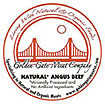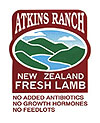By
Diann Bitker
|
|
|
Vines
with snow
laden mountains |
Golan
Heights Winery Entrance |
Winery
Vines in an arid region |
During the Yom Kippur War in
1973, the Golan Heights was the scene of fierce battles
between Israeli and Syrian troops. Today it is the prospect
of a peace agreement which threatens the residents' peace
of mind. Israel captured the strategic plateau from Syria
during the 1967 Mideastwar, and later annexed it. The
present Israeli government has indicated that it is willing
to give back the heights in exchange for a peace treaty,
but Israeli-Syrian peace talks, renewed last year, have
stalled again.
Israelis love the Golan, a beautiful area dotted with
gentle hills, the area's highest mountain, fruit groves,
waterfalls and ravines. There are several dozen businesses
operating on the Heights, built from scratch in a sparsely
populated wilderness area: a major dairy farm, two cattle
ranches and lots of apple orchards. There's a hot springs
spa and alligator farm in the foothills. If the Golan
were given up Israelis would also lose their only ski
slopes and resort, and one of their few fine wineries.
The Golan Heights has turned out to be the Bordeaux or
the Napa valley of Israel. The Golan Heights Winery is
perhaps the best known brand name associated with the
Golan Heights, producing some four million bottles of
prize-winning vintages yearly. The winery, which is jointly
owned by eight local kibbutzes and towns, (moshavim) was
founded in 1983. It harvests 4,000 tons of grapes a year
and produces some 300,000 cases of premium red, white,
and sparkling wines under the Yarden, Gamla,and Golan
labels, which win awards every year from the most prestigious
international wine competitions. It boasts up-to- date
crushing, pressing, and pumping equipment; 200 stainless-steel
tanks thermostatically controlled by computer; and French-oak
maturation barrels.
But even peace talks that have stalled or failed are an
indication that some political movement is going on. This
can make for a nerve-wracking life. The 18,000 residents
on the Heights, generally speaking, teeter between normal
life and abnormal anxiety about their future, and owners
of businesses on the Golan Heights are contemplating their
options.
But the Golan Heights Winery insists on conducting business
as if there were no threat on the horizon. General manager
Shalom Blayer says the winery has no intention of abandoning
a major investment drive, despite the fact that its vineyards
are likely to be handed over in any peace settlement with
Syria. And they are pressing ahead with plans to expand
the annual harvest and production, and increase the number
of staff.
Blayer refuses to discuss what they would do should they
actually have to face the unsettling prospect of having
the company's home base on the Syrian side of the border
in the not-so-distant future. Back in 1994, he explains,
the situation was similar. Then there was constant talk
of a deal, and a withdrawal from the Golan. People told
him then that he had better start packing his bags, and
hordes of journalists made pilgrimages north to ask him
how he felt.
"I cannot tell you that we don't think about what
will be doing if Syria takes over this area. We are thinking
about it," Blayer declares, "but we're not talking
about it. Because now we are at a junction where we are
fighting to stay here and to continue to produce here.
It will be a democratic fight, it will be a fair fight,
but we will fight."
Another major firm here, the Mai Eden Mineral Water Company,
is already looking towards a future outside the Golan
Heights by buying European businesses, and has sold part
of its company to a firm in California as a defensive
move. The company reportedly has prepared alternative
plans to relocate the main production facility elsewhere
in Israel, or even to continue operating out of Syria.
Whether a company came to the Golan for business or ideology
plays a large factor in how it responds to the on-again
off-again Syrian-Israeli talks. Shalom Blayer says that
unlike Israelis who came to the Heights to make money,
the owners of the Golan winery first settled in the Golan,
and only then started looking for business opportunities.
"The people who own this winery are not businessmen
from Tel Aviv who came to the Golan Heights to establish
a business. We built a whole life here. We are emotionally
connected. This is our only home now."
|





























